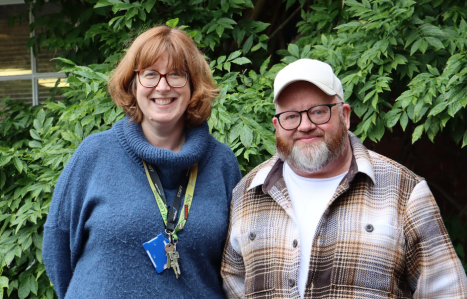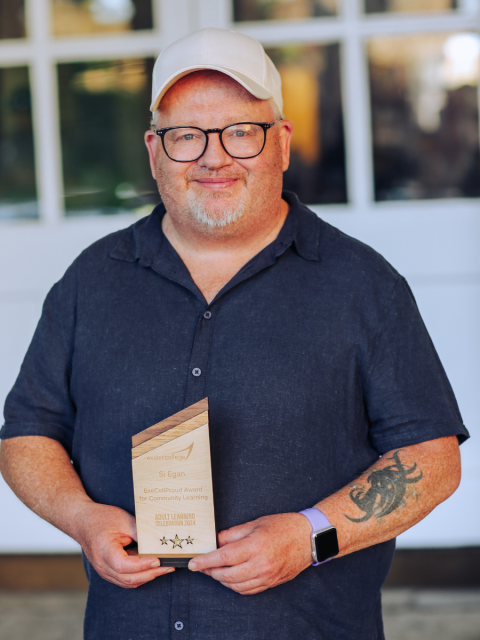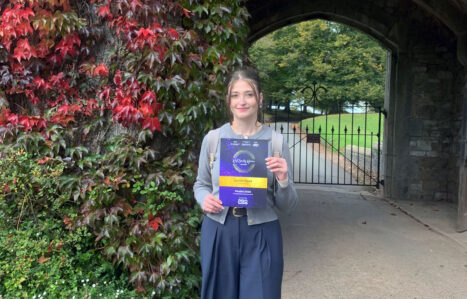
How lifelong learning can help combat isolation and anxiety
We all know the benefits of lifelong learning; how it’s good for our brains, our mental health, our physical health. There are unexpected benefits too, some that come with growing a community of like-minded people and sharing something special.
One Exeter College learner, Si Egan, has been on quite a journey since he first stepped into an adult learner Creative Writing class delivered by college tutor Sam Watson, through the Devon Recovery Learning Community. Here they talk a little about that journey together.

Si explains, “The first course I did was the Devon Recovery Learning Community one at St Sidwell’s and that was not long after the end of lockdown. I had already been off work with anxiety for about a year, I had left that job and realised I needed to get out and start doing something.
“I conveniently live just above St Sidwell’s Community Centre, so it was just downstairs, which meant I could risk going down. I snuck in and sat as near to the door as possible in case it was too overwhelming. It was like an escape if I found it too much, but it wasn’t, it was great. It was a good group – there was no pressure, you didn’t have to share stuff if you didn’t want to.”
Sam remembers this clearly, adding;
“He came and sat in a chair by the door the first week. It wasn’t a big room. There were a few empty chairs around the room, but he specifically sat by the door and I thought ‘I’ve noticed that. I’ve seen you’ and I wondered whether at break he might just quietly leave and not come back. He did come back, and I noticed each week he sat on a different chair and came further into the room. It was one of the best things.”
Putting that tentative foot through the door opened new opportunities for Si, connecting him with new people across the city. He has since done several writing courses with Exeter College through the Devon Recovery Learning Community and the Urban Learning Academy.
“It was good to listen to other people and see what came out of that. That made me get as far as outside St Sidwell’s to the library. And then to here, all the way to the Community Centre on St Davids Hill, which, when you have been very isolated, is like the other side of the world really.”
Si credits his regular return to these classes with the need we have to listen and learn from others, saying;
“I think for me, it’s about the social aspect of it. I get a lot of ideas from other people. You get to know about other people and their lives and the way they view the world. It can be very different from where you are. We all need some interaction. Something I’ve started is my own creative writing class on a Friday afternoon. The main thing that I try and focus on is I’m not really trying to teach creative writing; I’m trying to get people to listen to each other and be heard in that space. It’s amazing how some people don’t get that. They’ve got no one to listen to them and that is hugely important.”
Sidwell Scribblers, as it is now called, came about after a workshop making chutney, in which Si realised it wasn’t about learning to make chutney, but the desire to help others.
“It was just hilarious because I wasn’t paying attention to what we were doing. We were trying to measure things out and put them into the blender, the whole room was laughing their heads off and I realised, I want to do something like volunteering because the chopping up was quite therapeutic!”
Through working with St Sidwells, Si was then successful at securing funding from Recovery Devon and Devon County Council, enabling the Sidwell Scribblers a regular spot.
“I’d say some of the people who come are more serious writers than others, but I’m just trying to get people to come and interact really. I think it’s good for your mental health, that sort of interaction and acceptance.”
Sam describes Si as having an innate feeling for other people. “When we get new learners into classes, they don’t know anybody else, and you can pick up that they have some anxiety, or they have some issues, and Si doesn’t even say anything specific but there is just a feeling that it’s going to be okay. You might be quite chatty, but some weeks it’s enough to step out of your door and get into a different space for a couple of hours. Have a cup of tea. Maybe just sit back and just allow the chats to go on around you but you have a different space and he is really good at that.”
Si’s connection with people certainly seems to be getting noticed as he recently facilitated an activity for Recovery Devon for their annual reports day. Choosing to write a collaborative poem, ending up with three amazing sheets of writing. He also gave a powerful talk about how he supported his recovery journey through Creative Writing, citing the courses as a support structure to write and to learn to listen.
Si is also soon to be published in Lumpen magazine, writing what he describes as “quite a miserable piece about going to get some electric from the co-op and coming back.”
“There was a sinkhole outside St Sidwell’s, which I was fascinated by as an idea, and I culminate with the idea that the entire place will just collapse in on its own. This sinkhole is like metaphor for society just saying we want all these troubles to go away – we don’t want there to be poor people and we don’t want to see them.”

Earlier in the year, Si was also awarded the Exeter College Award for Community Learning at the end of year celebration where he was applauded by his fellow learners. Sam says,
“To see that journey from sitting by the door, to having your work on display at the cathedral, to running your own group, to being successful and applying for funding for these things. It’s just a phenomenal thing to see. Si is funny, charming, and knowledgeable and is always aware of those learners in class who might be feeling a little bit anxious. As a teacher, it’s a lovely thing to witness such collective support amongst learners for each other.”
If you would like to know more about Adult Learning with Exeter College, please call our friendly team on 01392 400170 or visit us at an Open Event.



